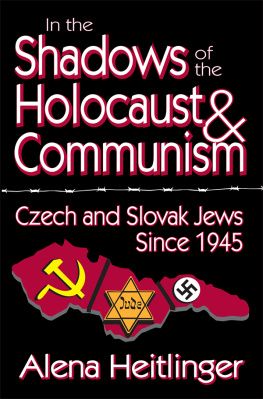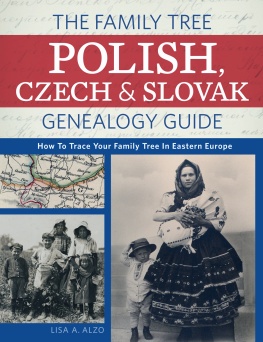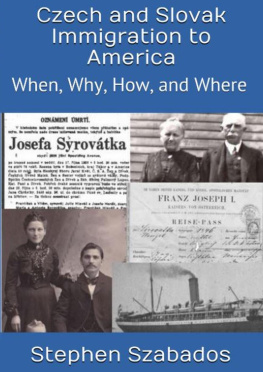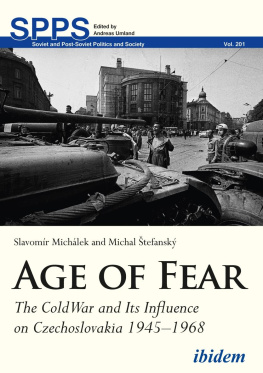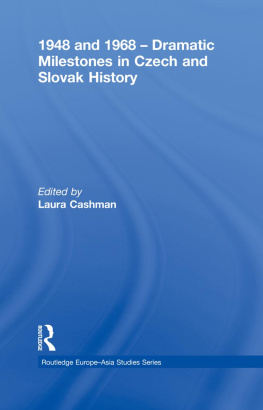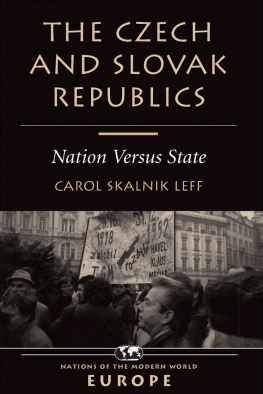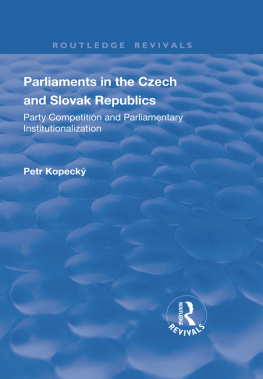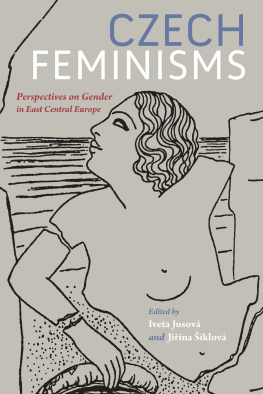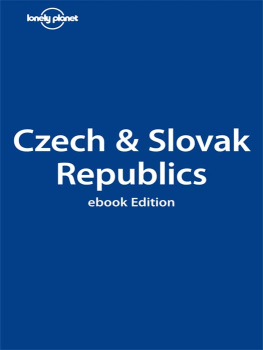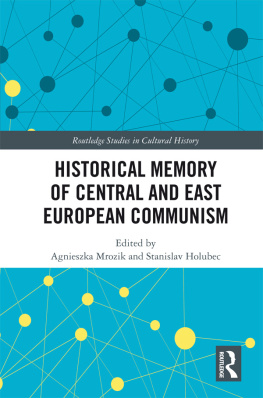In the Shadows of the Holocaust & Communism
In the Shadows of the Holocaust & Communism
Czech and Slovak Jews Since 1945
Alena Heitlinger
First published 2006 by Transaction Publishers
Published 2017 by Routledge
2 Park Square, Milton Park, Abingdon, Oxon OX14 4RN
711 Third Avenue, New York, NY 10017, USA
Routledge is an imprint of the Taylor & Francis Group, an informa business
Copyright 2006 by Taylor & Francis.
All rights reserved. No part of this book may be reprinted or reproduced or utilised in any form or by any electronic, mechanical, or other means, now known or hereafter invented, including photocopying and recording, or in any information storage or retrieval system, without permission in writing from the publishers.
Notice:
Product or corporate names may be trademarks or registered trademarks, and are used only for identification and explanation without intent to infringe.
Library of Congress Catalog Number: 2006044472
Library of Congress Cataloging-in-Publication Data
Heitlinger, Alena.
In the shadows of the Holocaust and communism : Czech and Slovak Jews since 1945 / Alena Heitlinger.
p. cm.
Includes bibliographical references and index.
Contents: Czech and Slovak Jews of the postwar generation: an overview The socio-political context(Non)remembering Jews and the Holocaust The parental generation of Holocaust survivorsThe postwar generation : coming to terms with JewishnessJewish youth groups of the 1960s Emigration and a sense of homeThe end of Czechoslovakia and the reconstruction of Jewish memoryInstitutional renewal and conflict after 1989 Rethinking Jewishness and Jewish identities.
ISBN 0-7658-0331-3 (alk. paper)
1. JewsCzechoslovakiaHistory20th century. 2. JewsCzechoslovakia Identity. 3. Holocaust, Jewish (1939-1945)Czechoslovakia Influence. 4. Holocaust survivorsCzechoslovakiaHistory20th century. 5. CzechoslovakiaEthnic relations. I. Title.
DS135.C95H45 2006
305.8924043709045dc22
2006044472
ISBN 13: 978-1-4128-4956-2 (pbk)
ISBN 13: 978-0-7658-0331-3 (hbk)
In memory of
my parents,
Hana and Ota Heitlinger
and
my grandparents,
Luisa and Adolf Heitlinger (murdered in the Shoah)
and
Anna and Fritz Knpfelmacher (who survived by emigrating in 1939 to Palestine)
Contents
Survey Respondents Years of Birth
Nationality/Ethnicity of Spouses/Partners of Survey Respondents
. Wartime Experiences of Parents
. Responses to the Question When did you become aware that you are Jewish?
Survey Respondents Attitudes towards Israel as a Jewish State
Survey Responses to the Question I would not feel at home in Israel because
Survey Responses to the Question How did you experience the partition of Czechoslovakia?
. Survey Responses to the Question What is your current opinion on the partition of Czechoslovakia?
Survey Respondents Attitudes to the Question of Who is a Jew?
Survey Responses to the Question I am attracted to Jewishness by:
Survey Respondents Attitudes towards Concealment of Their Jewish Descent
Positive Attitudes to Jewishness by Survey Respondents
Responses to the Question When did you become aware that you are Jewish? Supplement with a description of the circumstances under which you learned about it
Titles of Lectures for Jewish Youth at the Prague Jewish Town Hall, 1966-1974
Perspectives on Where is My Home?
Chronology of Significant Events at the Prague Kehillah, April 2004 December 2005
I would like to thank the Social Sciences and Humanities Research Council of Canada (SSHRC) for its generous financial support of this study.
I would also like to gratefully acknowledge the support of friends and colleagues who discussed the project with me in the initial stages of its formulation, suggested additional references and colleagues to consult, and critically commented on the first draft of the questionnaire. I want to thank in particular Veronika Ambros, Michal Arendt, Petr Brod, Fedor Gl, Peter Salner, Eva Sternkker, and Helena and Karel Wiener. Karel Wiener also provided helpful comments on earlier draft of , for which I am particularly grateful. Special thanks are due to Michael Morrison for his technical assistance with this project, and to my husband, David Morrison, who gave me encouragement, support, critical comments and editorial assistance throughout the writing of this book.
Most of all, my thanks go out to the more than 200 participants in this study for their time, patience and cooperation, and their willingness to open up their lives not only to me, but to the readers of this book. Without their strong support for this project, this study would not have been possible.
Parts of this book draw on material previously published: Jewish Youth Activism and Institutional Response in Czechoslovakia in the 1960s, East European Jewish Affairs, 32/2 (December 2002): 25-42; Growing up Jewish in Communist Czechoslovakia, Jewish Journal of Sociology, XVL/1-2 (2004): 5-34; and Politicizing Jewish Memory in Postwar Czechoslovakia, East European Jewish Affairs, 35/2 (December 2005): 135-153.
1
Czech and Slovak Jews of the Postwar Generation: An Overview
This book is about identity and community formation among a post-war generation of Czech and Slovak Jews who grew up under Czechoslovak communism and who came of age during the de-Stalinization period of 196268. The main focus is on inter- and intra- generational differences and similarities, and on the changing historical and political circumstances of Czechoslovak state socialism/communism that have shaped an individuals consciousness and identity as a Jew, an assimilated Czech, Slovak, or Czechoslovak and, where relevant, as an migr or an immigrant.
The study also addresses a larger set of research questions about the formation of Jewish identity in the midst of political upheavals, secularization, assimilation, and modernity: Who is a Jew? How is Jewish identity defined? How does Jewish identity change based on different historical and social contexts? How is Jewish identity transmitted from one generation to the next? How have the Holocaust, communism, and postcommunism impacted on what being Jewish means to Czech and Slovak Jews, and what do these two cases tell us, in comparative terms, about similar experiences in other former communist countries, or in established liberal democracies such as neighbouring Austria?
Design of the Study
Conceptual Framework
When traumatic historical events and transformations coincide with ones entry into young adulthood, the personal and historical significance of life course transitions interact and intensify. The basis is then laid for a cohort generation, characterized by a common habitus (orientation to life),
The present analysis of the role of history and of generation in shaping contemporary national, ethnic, religious and/or secular Czech/Slovak Jewish identities relates both to those who remained in Czechoslovakia and those who emigrated, either to Israel in the mid-1960s, or across the globe after the Soviet invasion of August 1968. The two main categories employed for the analysis of generational similarities and differences among postwar Czech and Slovak Jewry are concepts of symbolic ethnicity and collective memory. My examination of the pluralism of Czech and Slovak Jewish identities of the various birth cohorts, and of the potential in-built conflicts among ethnic, national, and religious loyalties, will also rely on the postmodern notion of coming out Jewish,

